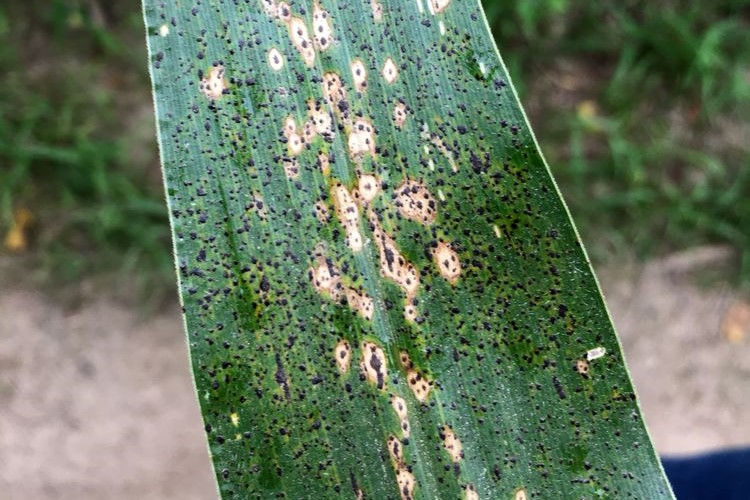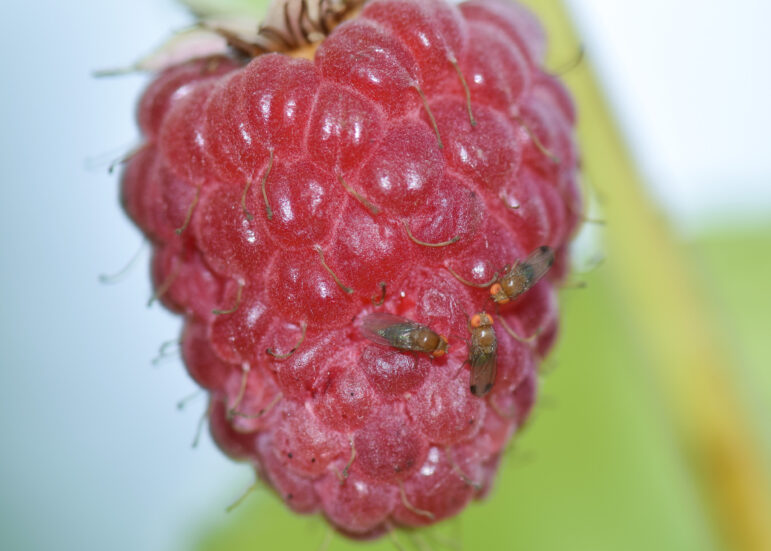
Michigan State University
Tar spot is a fungus that attacks corn and causes production losses.By SARAH ATWOOD
Capital News Service
LANSING – As warmer-than-average growing seasons caused by climate change become more common, they bring new invasive species to Michigan.
“Insects that like warm weather are finding that Michigan is becoming more and more life-sustaining than ever before,” said Bruno Basso, a professor in Michigan State University’s Department of Earth and Environmental Sciences.
And that requires new ways to fight them.
“These invasive species to Michigan are resistant to pesticides that farmers previously relied upon,” Basso said. “So farmers are looking for new ways to improve the ecology of their crops and improve their resistance.”
Two new threats are “tar spots,” in corn, and spotted wing drosophila, said Laura Campbell, a senior conservation and regulatory relations specialist at the Michigan Farm Bureau.
Tar spots are raised black dots on the ears of corn caused by a fungus called “phyllachora maydis,” Campbell said. An outbreak in a corn field causes production losses and economic disaster for the farmers.
Spotted wing drosophila is an insect that attacks soft fruits, a big problem for Michigan’s cherry orchards, Campbell said.
The female insects lay eggs inside the fruit, causing brown, sunken spots. As the larva eats the fruit it becomes rotten and nonconsumable.
Farmers attack new insects with technology, Basso said. Drones can pinpoint where an insect or weed is on their farms. Then they spray the specific area before it worsens.
Another example of emerging technology is the advancement of Enviroweather, a Michigan State -based weather service that can help farmers anticipate threats to their crops, Campbell said. The site tracks invasion trends, warning farmers ahead of time if pests are headed their way.
“Preventative pesticide spraying is best, because it will deter the invasive insects and weeds from being able to attack the crops,” Campbell said. “This greatly reduces the amount of pesticides needed, which is good for the farmer and the surrounding land and water.”
Scientists are also making advances in the kinds of products used on farms, Basso said. Biodegradable plastic mulch is replacing synthetic mulch that does not decompose. More plant-based pesticides and herbicides are becoming available.
Heather Anderson, the owner of Green Wagon Farm, in Ada in Kent County, uses all-natural products to combat insects and weeds on her certified organic farm.
“We are constantly vigilant for new threats to our crops,” Anderson said. “We don’t do preventative spraying, instead we scout the farm ourselves, and pick weeds by hand.”
At 18 acres, Green Wagon Farm is much smaller than the average U.S. farm size of 211 acres, according to the U.S. Department of Agriculture. Removing weeds by hand becomes more difficult on large farms.
“It’d be nice if all farms could be fully biodegradable and have no waste, but sometimes synthetic products are unavoidable,” Basso said.
This is not to say that farmers aren’t looking for more sustainable methods.
“Pesticides are incredibly expensive, and it would be more cost-effective to spray one small area than to have to spray an entire field,” Campbell said. “There’s a notion that farmers want to spray pesticides everywhere, and don’t care about the impacts on the land and water. But the land and water is their livelihood.”
A challenge is the communication between farmers and scientists, Campbell said.
Scientists lack the hands-on experience of being a farmer, and this makes it difficult for farmers to trust that their advice is best.
Money is also a big factor, according to Basso.
“Farmers have historically been more conservative when it comes to implementing new practices,” Basso said. “They have a financial risk, because if they change a way of doing something and it doesn’t work out, they lose that money that they would’ve made before.”
But as the weather gets warmer, farmers understand that their practices have to change or they will not be able to survive, Campbell said.
“Farmers want to do the right thing,” Campbell said. “I’ve never met a farmer who said they don’t care when it comes to the environment.”

University of Minnesota Extension
Spotted wing drosophila is an insect that lays its eggs on the inside of fruit, like this raspberry, causing it to rot.